
|
There was no clear definition of a second wave of COVID-19, with some insisting the pandemic simply continues to rage and others suggesting current spikes are entirely new developments. Considering what the first few months of the pandemic did to the economy, what do we think new variants and new waves could do?
To understand employment security amid the continuing COVID-19 pandemic, we spoke to more than 1,200 employed people in January of 2021 from across the U.S. They explained their current workloads, their vaccination plans, and their levels of anxiety over potentially losing their job. If there's any indication of what could happen to our economy amid a second wave, it's here.
With infections caused by the COVID-19 delta variant skyrocketing and expected to be on the rise through the fall of 2021, we re-examined the concept of job security amid the pandemic via a study conducted in August 2021.
Our study begins with a look into both how satisfied and secure employed people feel in their current positions. Respondents also shared how their workload has changed since 2021 began.
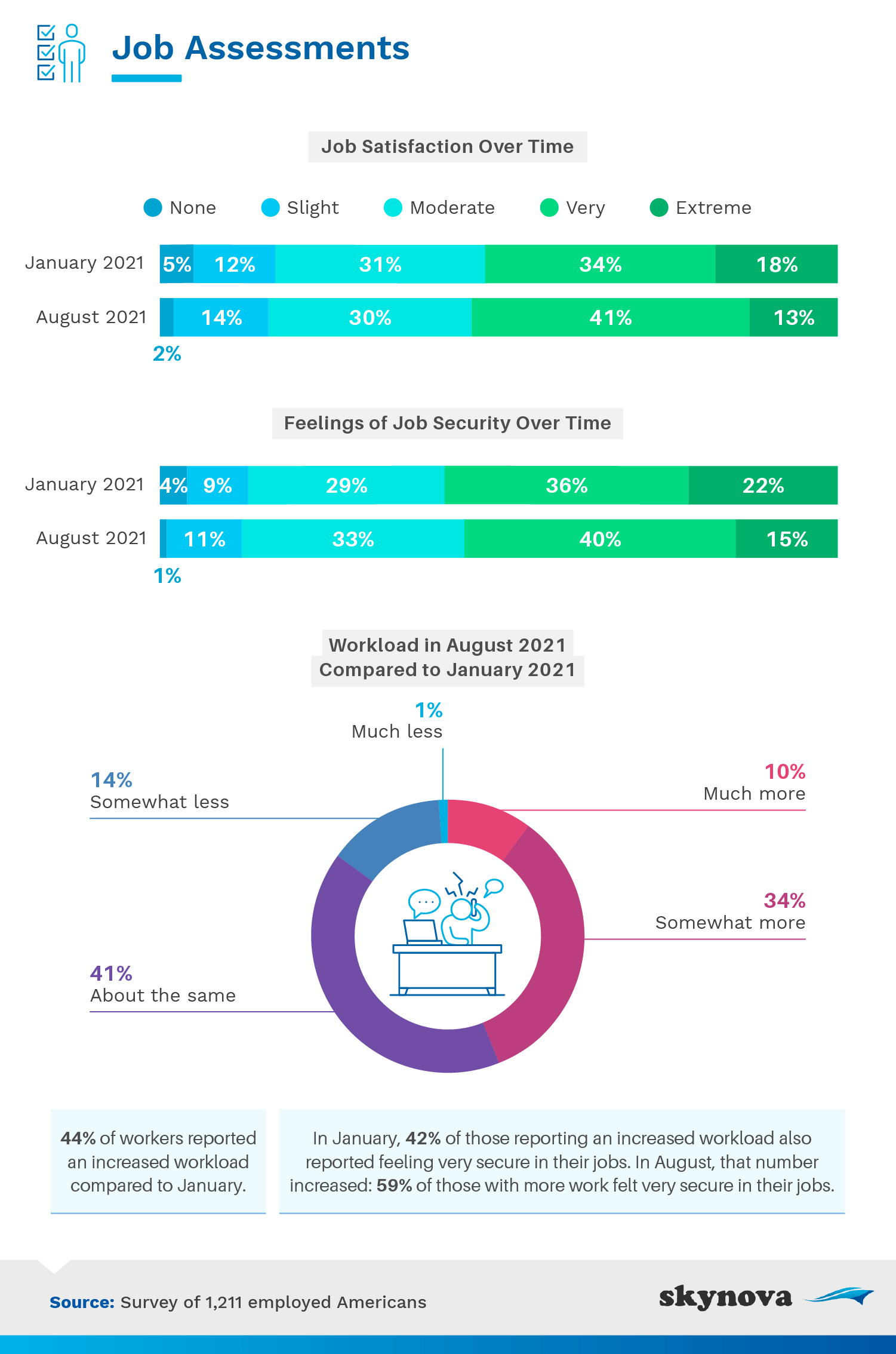
Both job satisfaction and job security – among those who already had jobs – were relatively high, especially considering the second wave we are facing. The vast majority of employed people considered themselves at least moderately satisfied and moderately secure in their workplace today.
Workloads had increased since the pandemic, however. Only 1% said they somehow had much less work since January of 2021. Considering the mass layoffs that occurred since the pandemic began, it's likely that employees who did have smaller workloads were let go, and those loads were absorbed by the employees who now report their workloads as having increased. Job security may come as a burden to employees, with almost 60% of those who reported having much more work these days also reporting being much more secure in their jobs.
Comparing January data to that collected in August of this year, we see a decrease in extreme job satisfaction, down by 5 percentage points. The number of those feeling most secure at their jobs is also down 6 percentage points since January, with the less-certain ranges from slight to moderate job security increasing those same 6 percentage points. This shift may be due to employers continuing to practice extreme caution with regards to disruption-minded contingency plans.
With the COVID-19 vaccine unlikely to become mandatory, we wanted to ask employees what their plans were once the vaccine became widely available. We also asked them to share their opinions on how they felt their employers should handle vaccinations within the company.
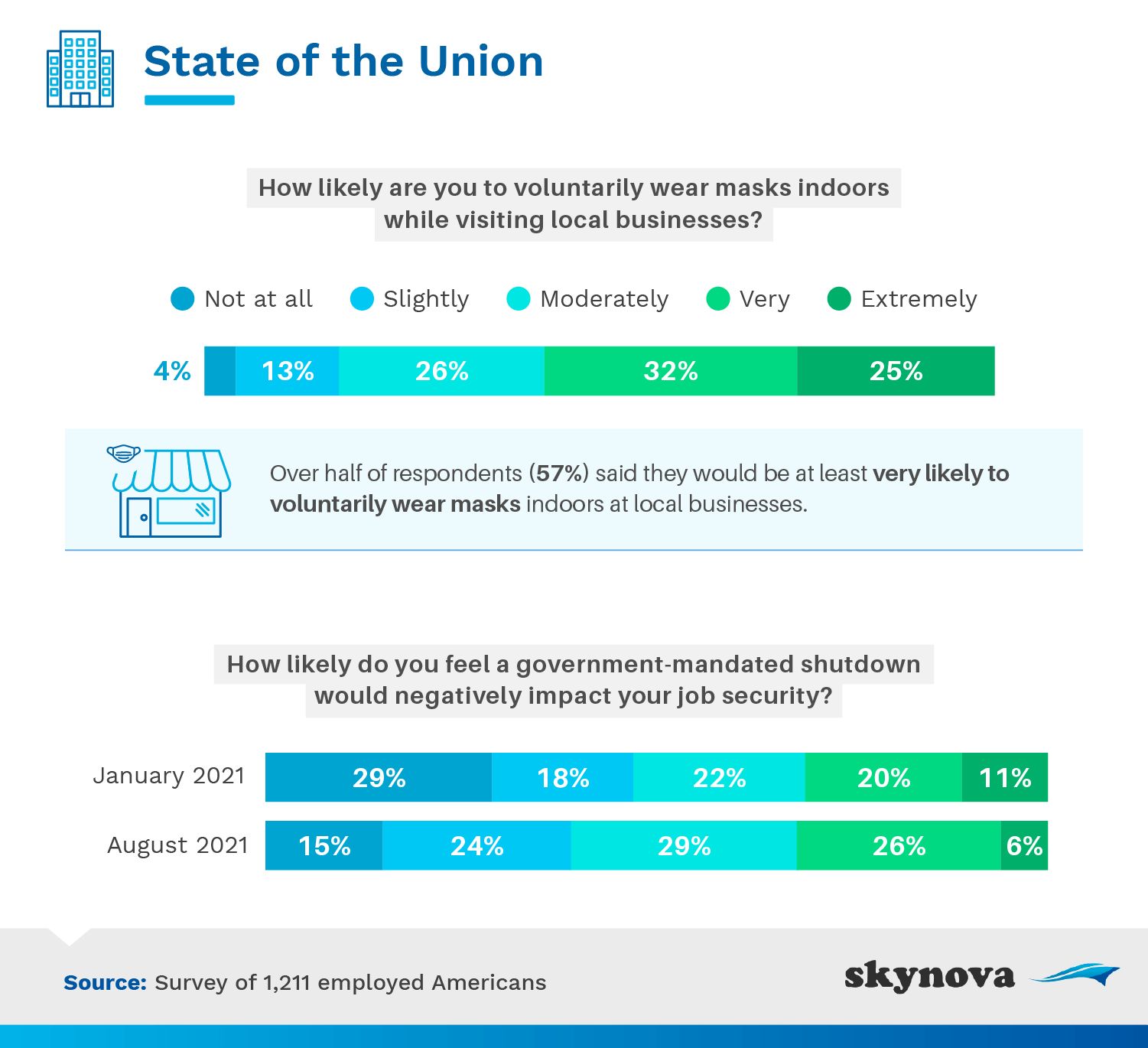
In January of 2021, most employees planned on getting the vaccination or at least considered themselves very likely (19%) or extremely likely (44%) to get it.
When it came to their employers, however, most employees wanted them to make it a priority. Fifty-four percent agreed that yes, it's very or even extremely important that their employer makes vaccinations a priority. This mentality and encouragement in getting the vaccine may help achieve what's known as "herd immunity" where the entire population can become immune for all intents and purposes, even if slightly less than 100% of people receive the vaccine.
While the COVID-19 vaccine has yet to be federally mandated, August's survey reported a much higher number of respondents who had already received the vaccine – an increase of almost 25 percentage points. The Pfizer-produced COVID-19 vaccine, marketed as Comiernaty, was approved by the FDA in August of 2021, so this percentage will likely continue to increase. As far as business-mandated protocols, only 3% of our August respondents were not supportive at all of mask requirements being set at the facility-level.
With a new administration taking charge of the U.S. executive branch in 2021, we wanted to make sure we gauged how respondents felt certain government mandates would impact job security. Even without a federal mandate, a vast majority of Americans (83%) said they would be at least moderately likely to voluntarily wear masks while visiting local businesses.
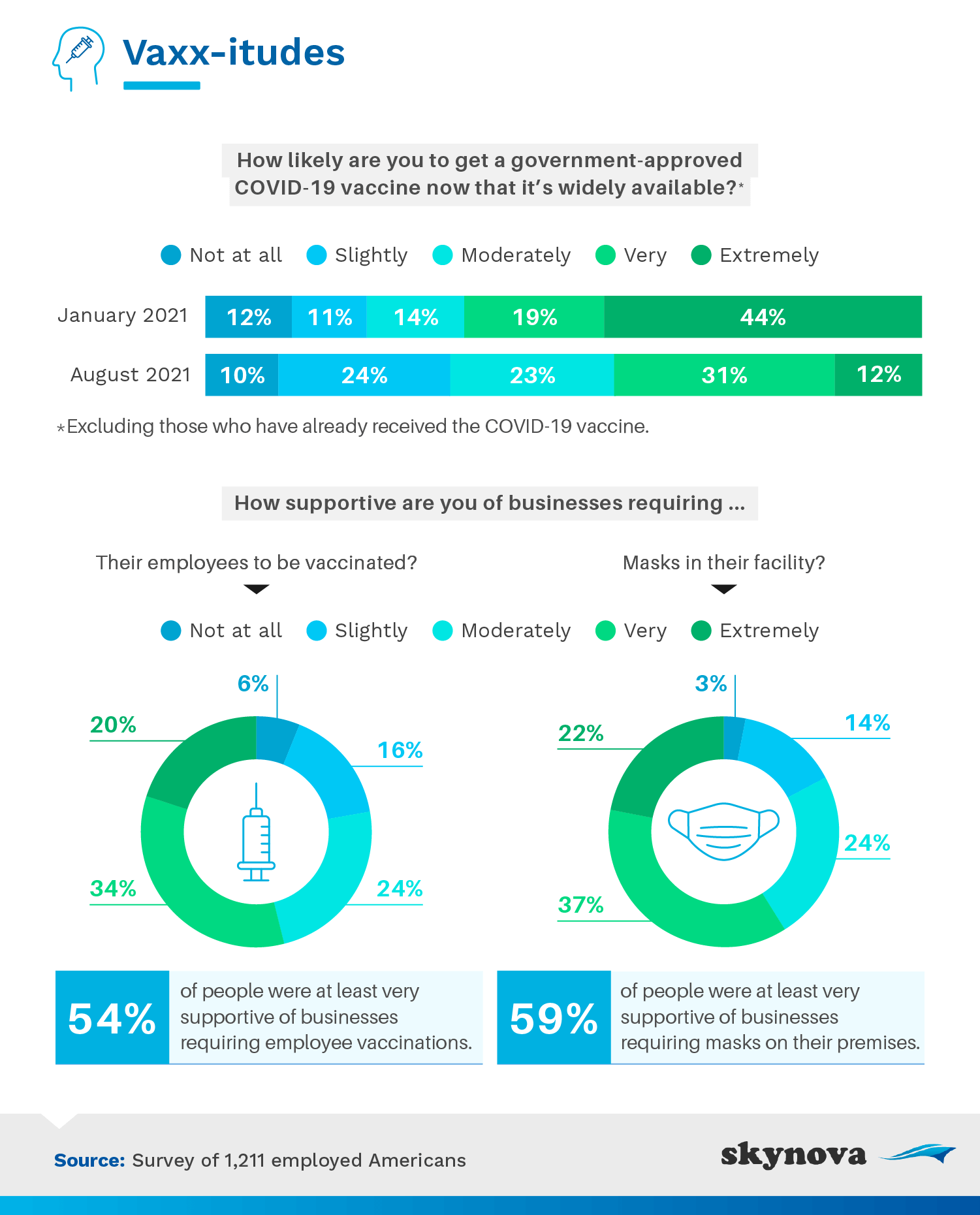
If an additional government-mandated shutdown occurs, fewer than a third of currently employed people felt their job security would be fine. The vast majority agreed that their jobs would be at least somewhat at risk. In the time since January, employees' attitudes have changed. The percentage of employees fearful that another government shutdown would at least moderately negatively impact their job security increased by 8 percentage points, likely stemming from hikes in the unemployment rate resulting from prior historical shutdowns.
We would be remiss to not include a peek into the mental state of respondents. Considering this group has maintained an income, we'd hope for their anxieties to be somewhat minimal, but, unfortunately, such was not the case.
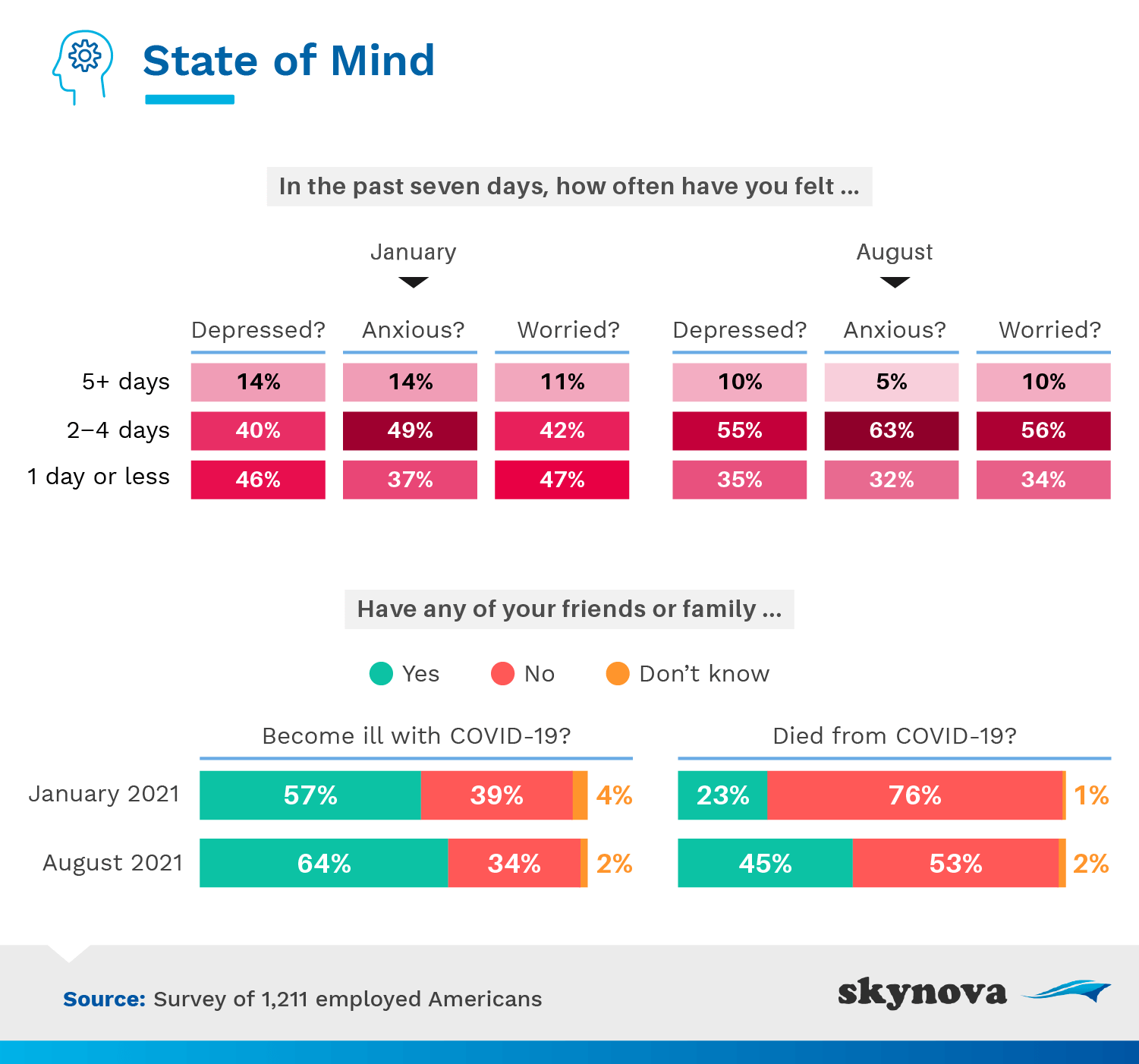
Prior to the pandemic, an estimated 18% of adults in the U.S. struggled with a generalized anxiety disorder. Throw in the pandemic and a fear of job loss, and that number has likely gone up. In January 2021, at least half of our respondents reported feeling depressed, anxious, or even uncontrollably worried at least two out of the last seven days. Over the last seven months, the number of people reporting one day or less of mental health issues dropped from an average of 43% to 34%. More and more people seem to be feeling the pressures of a continuing pandemic and an uncertain economy.
With a large segment of the population refusing a vaccine, and therefore still experiencing life-threatening cases of COVID-19, those reporting the death of a friend or family member due to COVID increased by 22 percentage points since January 2021.
Like many other things in this world, the pandemic became highly politicized. People's approaches to their own health often became influenced by their political party affiliation more so than by their doctors. The last part of our study looks at the impact politics has had on vaccination plans and opinions.
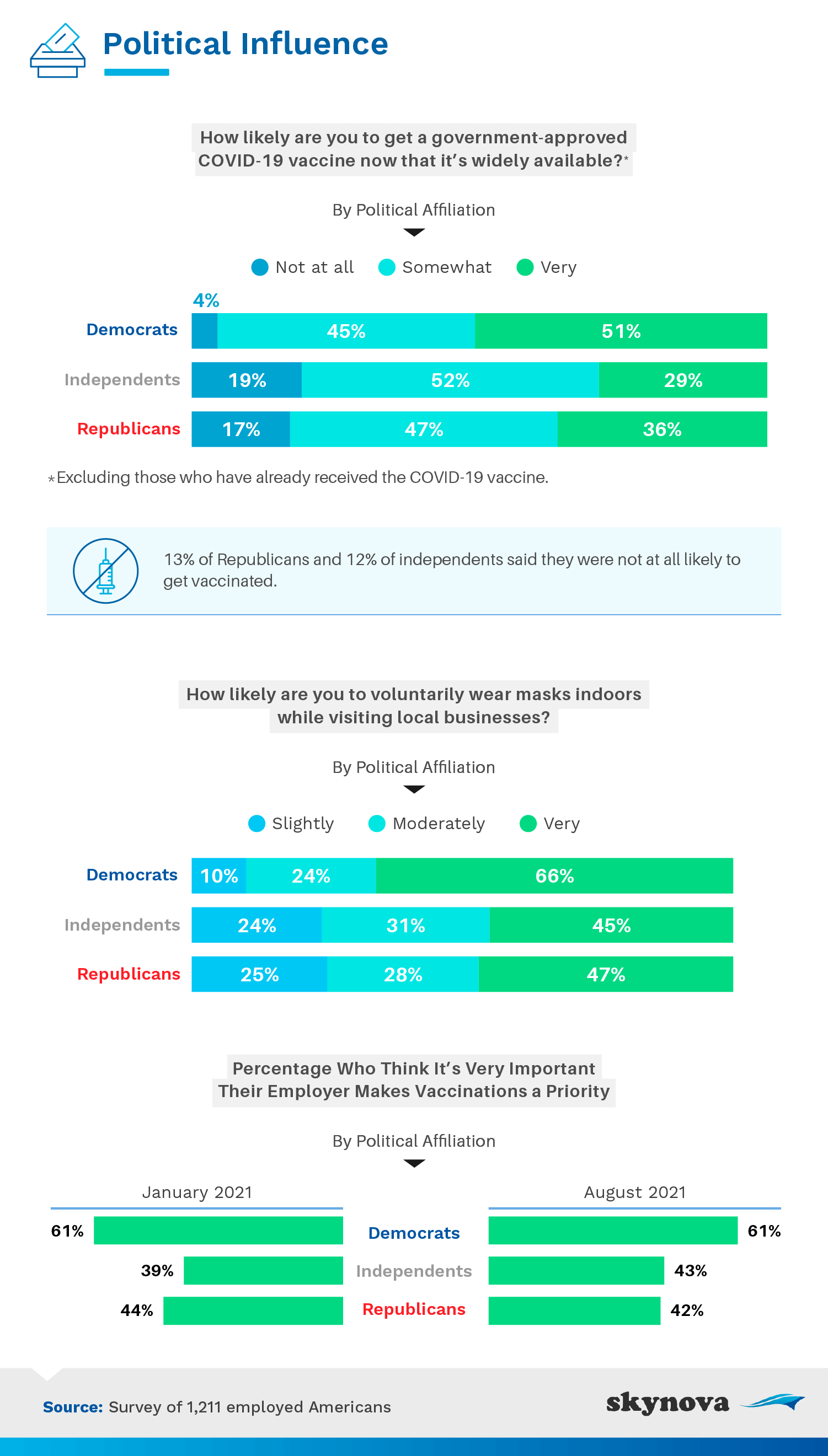
Political alliances clearly influenced personal approach to the vaccine. Republicans were much more likely than Democrats to say they were not at all interested in getting the vaccine, and Democrats were also more likely to report being interested in voluntarily masking-up inside local businesses. Attitudes about employer prioritization of vaccines remains relatively unchanged since January, with 61% of Democrats still very supportive of this effort and 42% of Republicans in support, down from 44% in January.
The prolonged effects of the pandemic are being continuously felt even now. The vaccinations show a light at the end of the tunnel for many, and most agree their employers should make the vaccine a priority. These feelings aren't shared across the political spectrum, however, with Republican-leaning respondents less likely to be interested in getting the COVID-19 vaccine and less likely to continue pandemic precautions like voluntary mask-wearing. As the vaccine becomes even more widely available to the larger population, American employees continue to navigate the workplace amid the politicized pandemic while attempting to remain hopeful for the future.
Skynova helps small businesses get paid faster. Skynova offers easy-to-use but highly professional templates and accounting services to help other businesses, both small and large, receive the payments they need to keep their business running smoothly. Even businesses with experience in this area are still better off outsourcing so that they can focus on their particular strengths and growing their ideas. Skynova can provide professionalism, affordability, and reliability that any thriving business needs.
We collected 1,211 responses from employed Americans through Amazon Mechanical Turk in January of 2021. 53% of our participants identified as men, 46% as women, and 1% as nonconforming or nonbinary. Participants ranged in age from 18 to 77 with a mean of 37.8 and a standard deviation of 11.2. We excluded those who listed their employment status as student, homemaker, or not currently employed. This sample's partisan breakdown was 50% Democrats, 30% Republicans, and 20% independents.
In August 2021, we collected 1,001 responses from employed Americans through Amazon Mechanical Turk. 59% of these participants identified as men, 40% as women, and less than 1% as nonconforming or nonbinary. Participants ranged in age from 21 to 76 with a mean of 37.2 and a standard deviation of 10.3. This sample's partisan breakdown was 55% Democrats, 31% Republicans, and 14% independents.
The data we are presenting rely on self-report. There are many issues with self-reported data. These issues include, but are not limited to, the following: selective memory, telescoping, attribution, and exaggeration. Our survey data were unweighted, and no statistical testing was performed, so the claims listed above are based on means alone. As such, this content is purely exploratory, and future research should approach this topic in a more rigorous way.
If you're feeling stressed or insecure about your current financial situation or job security, this study should show you are certainly not alone. If you think someone else could benefit from these findings, you are welcome to share the article. Just be sure your purposes are noncommercial and that you link back to this page.